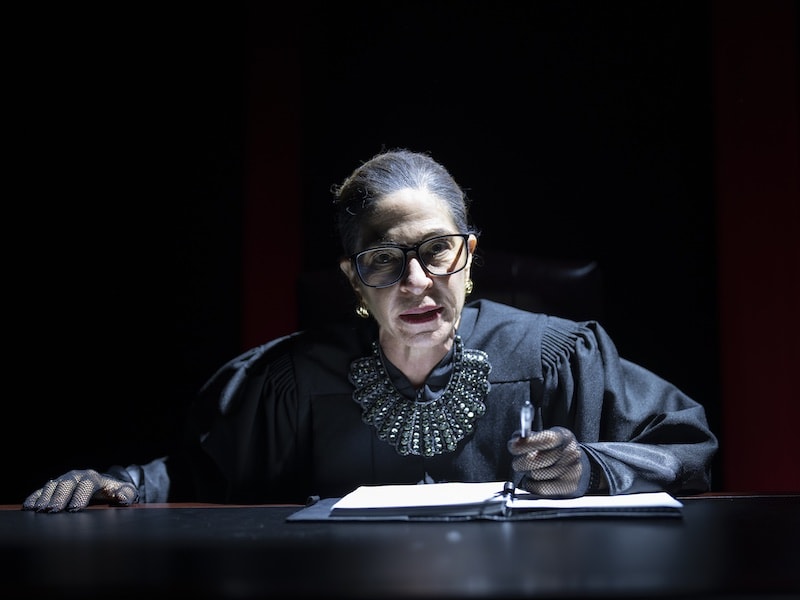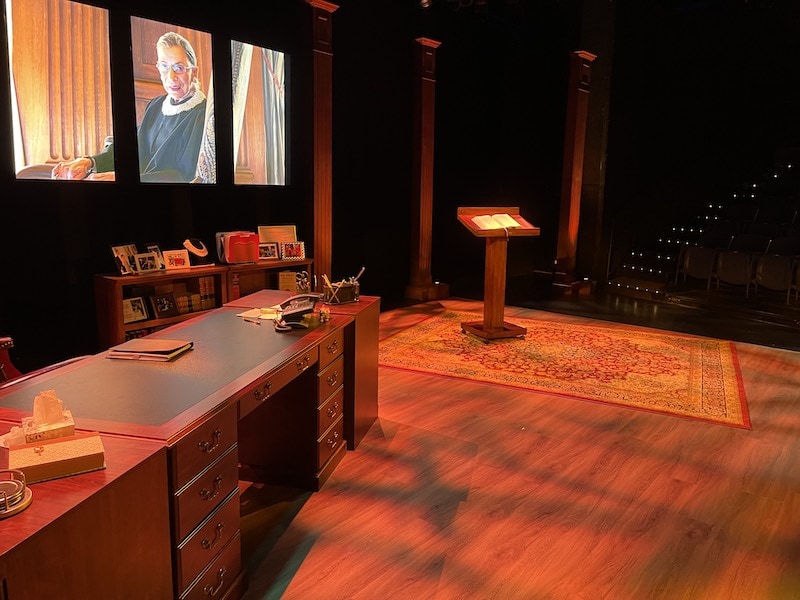The late great Ruth Bader Ginsburg — channeled onstage with uncanny grace by Michelle Azar — had been talking to us, her enthralled audience, as though we each were a visiting new friend being welcomed into her life. She told us of her youth, her family, her education, her aspiration. She shared with us her smarts, her humor, her gumption, her warmth. But there came a point when she stopped. She seemed to be choking up, unable to speak, holding back a sob. As though on empathic cue, we in the packed theater fell silent too, for what seemed a forever caesura of breathlessness and concern. The iconic RBG before us was telling us about the time she learned that the cancer invading the body of her beloved husband Marty was incurable. She was telling us what the doctor told her: “It’s time to take him home.” And we saw her nearly lose it.
Then we witnessed her go on.

As directed with surpassing sensitivity by Laley Lippard and written by multiple award-winning playwright-composer-lyricist Rupert Holmes, this new one-person play All Things Equal: The Life and Trials of Ruth Bader Ginsburg had come to DC’s Lincoln Theatre for one night only, the last stop on a nearly sold-out 16-city tour. All during the 90 minutes of surprising humor and stirring autobiography (plus fascinating lessons in equality law), the audience seemed to be responding not as to a theatrical performance but as if the revered Supreme Court Justice herself were in the house. The applause was for her, the laughter was with her.
The evening was transcendent.
Centered on the set was a massive wooden desk, at which Azar as Ginsburg sat when not crossing stage left to a podium to argue or downstage to address us intimately. Behind the desk rose a huge frame that served as a projection screen, at times displaying a background bookcase full of law tomes, at others documentary images and clips illustrating a remarkable intersection with history. Ginsburg appeared to us first in her black judicial robes with trademark lace collar and began by reading an essay she wrote as an eighth grader about the “bond of humanity” and the “brotherhood of man” — the latter phrase, she acknowledged, she would give a gender-equal edit to later in life.
The subsequent swift and feisty script contained many famous lines of hers, and Azar captured exactly how Ginsburg spoke through a smile, especially when being blunt. Referring to her male colleagues on SCOTUS as “grumpy old men,” for instance, she remembers being asked, “When will there be enough women on the court?” Her answer: “When there are nine.”
And lifting a quote from the abolitionist Sarah Grimké, she said, “I ask no favor for my sex. All I ask of our brethren is that they take their feet off our necks.”

Ginsburg’s legendary love of opera had stage time too as Azar lip-synced grandly to an aria from Puccini’s Madama Butterfly. We were treated to an excerpt from her exercise routine as she took off her robe to reveal a hot pink workout jacket and spryly took barbells in hand. And when the booming rap video that dubbed her the notorious RBG got played on screen, the audience, already in the palm of her hand, went wild.
Holmes cleverly sets up one Erwin Griswold as a foil and running joke. Ginsburg’s encounters with him go back to when as dean of Harvard Law he dismissively asked her at a welcoming reception to justify taking the place of a man. Years later she gets her comeuppance (she calls it “poetic justice”) when she was to start as Supreme Court Justice and it was Griswold who swore her in.
Ginsburg’s distinctive contribution to sex equality in case law was revealed in vivid narratives depicting her method of establishing generalizable principles of sex equality by arguing instances in which a man faced sex discrimination. It was a brilliant stroke, it disarmed male jurists’ prejudices, and it worked to broaden legal rights for women.
All Things Equal was conceived before the Dodd decision came down, and the end of Roe hangs heavily over our nation even as it looms over Ginsburg’s legacy. What would have happened had she retired when Obama, not Trump, could have picked her replacement? History will never know. Yet to the great credit of this production, Ginsburg addresses the matter head-on. The reason she didn’t retire, she explains, was that she thought Hillary would win and be the one to pick her successor. Her candor, if miscalculated, was a quietly sobering moment of reckoning with how much we lost when this great legal mind and clarion conscience passed.

Among the most uplifting motifs of the show was its valorization of dissent. As the court began to tip more and more to the right, Ginsburg’s dissents became more frequent and more fierce. “Dissents speak to a future age,” she explains. “The greatest dissents become court opinions and gradually become the dominant view. So that’s the dissenter’s hope: that they are writing not for today, but for tomorrow.”
Ruth Bader Ginsburg will not come again, even though All Things Equal is so moving it can have us suspended in belief that she has. Thereby does this thrilling work of theater instill a precious and visionary hope. For that reason alone, this show must go on and on.
Running Time: 90 minutes with no intermission.
All Things Equal: The Life and Trials of Ruth Bader Ginsburg played May 19, 2023, presented by Scott Stander performing at the Lincoln Theatre, 1215 U Street NW, Washington, DC.
The program for All Things Equal: The Life and Trials of Ruth Bader Ginsburg is online here.
A study guide for the production is online here.
SEE ALSO:
Laley Lippard and Rupert Holmes on their theatrical resurrection of RBG (interview with the director and playwright by Chad Kinsman, May 13, 2023)




